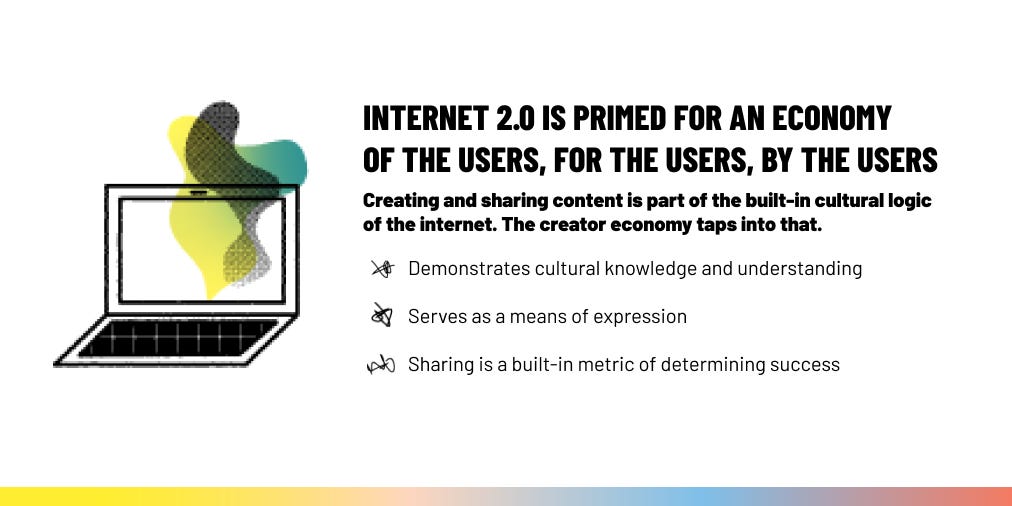The Rise of Solopreneurship
How Web 2.0 paved the way for creators to well, create.
The more that I dive into researching the media solopreneur, the more that I realize that we should have saw this coming. Web 2.0, or the evolution to the web towards being a participatory or social web, predicted that we’d have more folks creating, and networking online. In fact, the primary inventor of the World Wide Web, Tim Berners-Lee, argues that this was in his original intent — creating a two-way form of communication.
Web 2.0 and the desire to create
I'd argue that we could have started to see this coming with the rise of Web 2.0. Web 2.0 is defined as the movement where the internet turned from the majority of people consuming on the internet, to people actively engaging and creating with one another.
In one definition of Web 2.0, written by Graham Cormode and Balachander Krishnamurthy describes the shift as when users and creators became one of the same.
“However, the essential difference between Web 1.0 and Web 2.0 is that content creators were few in Web 1.0 with the vast majority of users simply acting as consumers of content, while any participant can be a content creator in Web 2.0 and numerous technological aids have been created to maximize the potential for content creation. The democratic nature of Web 2.0 is exemplified by creations of large number of niche groups (collections of friends) who can exchange content of any kind (text, audio, video) and tag, comment, and link to both intra–group and extra–group “pages.””
- Cormode and Krishnamurthy
This wave of the web's development relates heavily on sites having not only the ability to share content, but also in the creations, something that the primary inventor of the World Wide Web, Tim Berners-Lee, has gone on record that his original intention was to create a two-way form of communication.
In an article from the BBC, Berners-Lee argues that the web is a reflection of our humanity. Some of the problems that we’re seeing with solopreneurship are the reflections of that there's no mandate or guarantee that what you create online has to be of a certain quality.
“I feel that we need to individually work on putting good things on it, finding ways to protect ourselves from accidentally finding the bad stuff, and that at the end of the day, a lot of the problems of bad information out there, things that you don't like, are problems with humanity.”
- Tim Berners-Lee in the BBC
This sort of of the users, for the users, by the users sort of thinking has led to the rise of citizen journalists, the decline of paparazzis, and the rise of the media solopreneur.
The creator economy taps into this cultural logic of the internet through demonstrating knowledge and understanding, serving as a means of expression, and incentivizing sharing as a means of success. Largely what we consume on the internet, is what someone else created. In a world where anyone can create and share something — how widely it spreads or its physical impact becomes part of the metric of success.

The headbutting of journalism and this next wave
Journalism and the internet never naturally got along, in fact — one of the reasons that journalism has struggled to remain relevant is because of its resistance to the fast-moving nature of our online worlds and how they’ve chosen to evolve. We moved online but didn’t take into consideration how the online world was working and interacting.
Neiman Reports called it back in an article in 2006; journalism is moving too slow to notice the early adopting fringe that is soon to dominate the mainstream.
“Tomorrow’s potential readers are using the Web in ways we can hardly imagine, and if we want to remain significant for them, we need to understand how. Yet news organizations have been all too slow to notice movement in places that are away from what has been their center.”
- Francis Pisani for Neiman Reports
This type of thinking hasn't really evolved much in the past decade. Individuals surveyed as part of this research mentioned frustrations with the traditional newsroom not being able to keep up with the ways and culture of the internet as a reason to go it solo.
So, what can we learn from this?
Listen. Listen to those who may be on the fringe of what's next. Listen to early adopters, listen to those who read ten-thousand newsletters, listen to the Twitch streamers, the brand advocates, the influencers, the YouTubers.
In media, its taught that your competition is not only those in your industry, your competiton is anyone who's product is being consumed outside of your own. For newsrooms, this means that if someone is subscribed to 5 paid newsletters, and only one traditional news outlet — you should be damn well asking why.
Learning to not squander an idea, or to ask why are so many people are tuning into this, what piqued their interest? are skills that newsrooms should learn, and quickly. Adaptation is the name of the game here.
In a world where there’s countless different options to consumer, and new formats to keep up with every day — paying attention to the trends can make or break your world. 📈